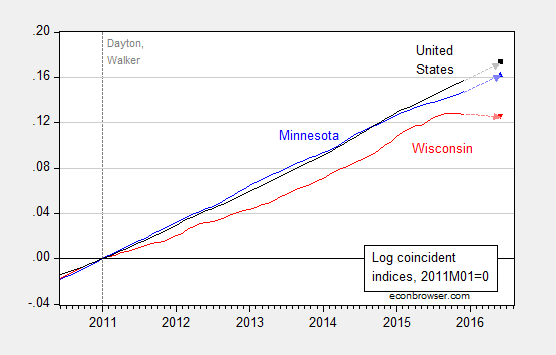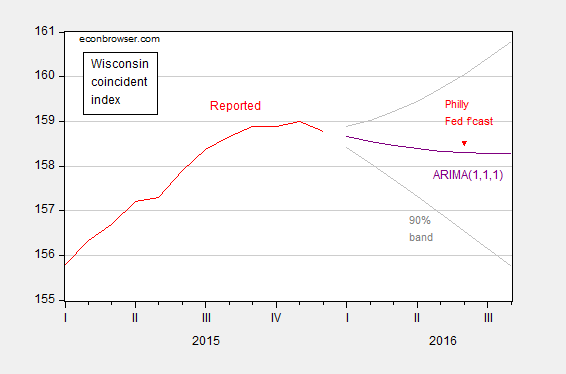The Philadelphia Fed has released leading indicators for December. Essentially zero growth in Wisconsin over the next six months is predicted.
Figure 1 compares the performance of the indicators for Minnesota, Wisconsin, and the Nation, normalized on 2011M01 (when Governors Dayton and Walker took office).
Figure 1: Log coincident indicator for Minnesota (blue), Wisconsin (red), and US (black), all normalized to 2011M01=0. Observations for 2016M06 are based upon December leading indices. Source: Philadelphia Fed coincident indices, leading indices, and author’s calculations.
The leading indicators extend the essentially flat performance over the past few months in Wisconsin. The Philly Fed forecast is slightly more optimistic than the projection from a simple ARIMA(1,1,1) time series model applied to the log coincident index over 1986M01-2015M12.
Figure 2: Coincident indicator for Wisconsin (red), forecast from Philadelphia Fed for 2016M06 (red triangle) are based upon December leading indices, and forecast from ARIMA(1,1,1) time series model (purple) and 90% forecast band. Source: Philadelphia Fed coincident indices, leading indices, and author’s calculations.
Fortunately, the Governor has assured us the state of the State is strong.


It is working! Implementing policies that are intended to turn Wisconsin into Mississippi is, in fact, turning Wisconsin into Mississippi.
Congratulations, Walker and friends.
Phil, you lack any important “facts” like Wisconsin population growth has slowed to a little more than 1% a year, its population is aging, and a “brain drain” may be taking place, because of old industries.
Wisconsin is the #2 state in the nation in manufacturing employment as a percent of non-farm employment. The stronger dollar has slowed exports.
Republicans always have excuses why their policies don’t work for the lower and middle classes. The fact is that their polices aren’t meant to work for anyone except the wealthy. I don’t know if you live here in Wisconsin, but I can tell you from talking to people who have lived here for a long time that his policies are responsible for the brain drain of higher educated young families leaving for better opportunities elsewhere. He is turning us into Wississippi.
Phil, you live better today, because creating wealth makes everyone wealthier.
The “rich” lifted living standards for the masses.
Of course, there should be a balance between becoming a superpower and becoming Greece.
And, it should be noted, 37% of Mississippi is African-American, who earn much less.
The rich “lifted” nothing but the wallets of the workers. Unions lifted living standards for the masses and their members were the ones who “created wealth”.
You had nothing in your wallet, until a “rich” person, who worked hard and took tisks, filled your wallet.
Good luck hoping a poor person will fill your wallet.
Overpaid union workers lifted from consumers and workers, who needed jobs.
It’s real goods & services that raised your standard of living, not being overpaid to underproduce. And, you’ll need a job to build wealth.
Of course, not all unions are the same. When I was in the CWA, I was told by my co-workers not to work so hard, because it was making them look bad, and they wanted overtime, which was a lot of money. We had a great compensation package too. However, I just couldn’t work that slow.
“You had nothing in your wallet, until a “rich” person, who worked hard and took tisks, filled your wallet.”
why must it be a “rich” person? the banking system should be set up to provide capital to great ideas. if it is set up to provide capital to “rich” persons, then the capitalist system which we practice is broken. great ideas are not the domain of the rich only.
peak, a fair capitalist system puts the same pressure on the person to make his first dollar in profit as his last billion dollars in profit. in a capitalist system, it should not be easier (nor should it be harder) to make money as your wealth increases. systems which support a model which advantages the wealthy, as your statement implies, will always lead to inequality that is detrimental to growth.
How does a poor person, who didn’t work hard and take risks, hire people?
You’re saying banks should lend money only for a “great idea?”
You want to take away what has proven to work and give to what has not proven to work.
“How does a poor person, who didn’t work hard and take risks, hire people?”
peak, i never said a “poor” person. but you stated, directly, it required a “rich” person to grow the company. there are lots of hard working, non rich people, who are opening and growing businesses. and they will take the place of your “rich” person if he/she gets lazy.
the right continues to promote the idea that you need to pamper the wealthy because they are the job creators. yes there are many privileged individuals who use their wealth to grow companies. but your commentary amounts to a direct assault on the entrepreneurial ideal which we are promoting around the country, where a small guy with a great idea, with hard work, grows a successful business. why limit it to the rich? you perpetuate inequality when you bias your favors to the rich.
Baffling, I didn’t say a rich person is required to start a business. I was responding to criticism of the rich by others and stating realities, like a poor person, who doesn’t work hard and take risks is unlikely to succeed starting a successful business. Taking a risk, like mortgaging your house, implies some wealth.
peak, but you did say a rich person fills your pockets. the implication in your commentary is protect the rich, because only they can help you. somebody who accumulates some wealth in their home as collateral for their business venture is not necessarily rich. they have simply acquired some capital through leverage with the bank, in order to work hard and make their business profitable. then they can put money in your pocket. you do not need to promote the rich in order to grow the economy.
Baffling, my definition of the “rich” was relative.
Anyway, a rich person does, as you say, “fills your pockets.”
And, you’re still making things up. I want to protect the rich and the poor, i.e. everyone, not just the rich.
If one of Wisconsin’s problems is an over-reliance on manufacturing, it seems like a smart investment would be to promote other industries. However, the current group of WI legislators seem to be opposed to that:
Tech leaders say UW budget cuts are a ‘dark cloud’ on the state’s economy
http://host.madison.com/wsj/business/tech-leaders-say-uw-budget-cuts-are-a-dark-cloud/article_ac7706f9-2e17-5888-901e-1bec425c2342.html
Also, it bothers me that current legislators want to selectively pass off issues to “local control” like funding for roads and education while selectively repealing the ability of local municipalities from enacting local ordinances for development zoning etc.:
https://gallery.mailchimp.com/7126ec513f66440e67bfd72aa/files/LFB_local_control_memo_updated_2_4_2016.pdf
Wisconsin needs to plant the seeds of a technology hub, like the Denver Tech Center in the 1970s. Then, in around 20 years, it may become big enough to be a significant part of the state’s economy. It will also attract high-tech labor from the rest of the country and the world. The Denver Tech Center was a vision by leaders in the private sector. However, government may be able to help.
PT,
UW-Madison is a huge source of research, private-public collaborations, trained professionals, and job generation for the state. Cutting funding for it makes no sense. https://www.rsp.wisc.edu/
Samuel, so, where does cutting funding make sense?
perhaps it simply does not make sense to cut funds at this point in time.
I would echo baffling’s comment. Years ago, when I worked at a business, it would also burn me when the accountants would ask on my yearly budget projections, “what are you going to cut?” My response was always, how the hell do you grow a business by cutting?
Successful businesses need to at least make a (normal) accounting profit to compete, which includes minimizing costs. So, there’s capital to expand. Otherwise, the business is on a path to bankruptcy.
Because of limited resources, a business needs to produce more output with fewer inputs. Otherwise, a business, or an economy, won’t have the capital and labor to expand. There would be stagnation.
And, the fact accounting wanted you to cut costs indicates your profits were too low or losses too high. It also suggests it would’ve been easy to cut costs. You could’ve simply copied your competitors, who outperformed you.
PT-you are right. I never could understand that profit thing. Cut costs till you end up with a pile of crap and hope your marketing dept. can convince consumers to buy the crap and raise prices.